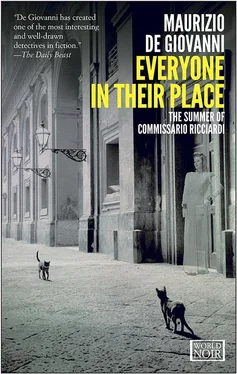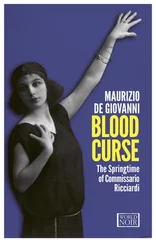Maurizio de Giovanni - Everyone in Their Place
Здесь есть возможность читать онлайн «Maurizio de Giovanni - Everyone in Their Place» весь текст электронной книги совершенно бесплатно (целиком полную версию без сокращений). В некоторых случаях можно слушать аудио, скачать через торрент в формате fb2 и присутствует краткое содержание. Жанр: Исторический детектив, Полицейский детектив, на английском языке. Описание произведения, (предисловие) а так же отзывы посетителей доступны на портале библиотеки ЛибКат.
- Название:Everyone in Their Place
- Автор:
- Жанр:
- Год:неизвестен
- ISBN:нет данных
- Рейтинг книги:4 / 5. Голосов: 1
-
Избранное:Добавить в избранное
- Отзывы:
-
Ваша оценка:
- 80
- 1
- 2
- 3
- 4
- 5
Everyone in Their Place: краткое содержание, описание и аннотация
Предлагаем к чтению аннотацию, описание, краткое содержание или предисловие (зависит от того, что написал сам автор книги «Everyone in Their Place»). Если вы не нашли необходимую информацию о книге — напишите в комментариях, мы постараемся отыскать её.
Everyone in Their Place — читать онлайн бесплатно полную книгу (весь текст) целиком
Ниже представлен текст книги, разбитый по страницам. Система сохранения места последней прочитанной страницы, позволяет с удобством читать онлайн бесплатно книгу «Everyone in Their Place», без необходимости каждый раз заново искать на чём Вы остановились. Поставьте закладку, и сможете в любой момент перейти на страницу, на которой закончили чтение.
Интервал:
Закладка:
Ricciardi heard Sofia Capece’s voice in his mind, as she claimed to be the angel of death. And he thought about jealousy, which had driven her so mad that she had decided to punish Adriana for betraying her own husband.
“And what happened to the favorite? Did someone shoot her between the eyes?”
Ettore laughed.
“No, of course not. She was kicked out of the house, that’s all. She was really rather lucky, wasn’t she?”
“But the duchess wasn’t lucky. She met quite a different fate.”
The man’s expression hardened.
“She was a bitch, Commissario. A vile, stupid bitch. She did whatever her diseased appetites suggested to her, she had no interest in anyone else’s feelings. If you expect thanks for having identified her murderer, don’t look at me. In fact, her lover’s wife has my pity and comprehension: she did what a great many of us ought to have done long ago, believe me.”
Ricciardi gave him a cool reply:
“It’s not up to you, or Sofia Capece, or anyone else to decide whether someone has the right to live or not. No matter how dastardly that person may be.”
The young duke shrugged his shoulders and smiled.
“The fact remains that someone, as you’ve seen for yourself, took that right. There’s another thing though: I’ve heard about your. . nocturnal strolls, and a certain visit you made to a building not far from where you live. As well as a lengthy conversation.”
Ricciardi nodded. He hadn’t expected Ettore to make any reference to the matter that concerned him, nor had he decided what he would do if he did: it had no conection to the investigation. All the same, the man clearly felt the need to talk about it. In fact, he continued:
“You see, Commissario, in a sense it’s almost a relief to be able to talk about it. I understand why Achille would do it. There are times when I want to jump out of my skin from the urge to talk about it. Like everyone who’s. . who’s ever been in love, I imagine.”
Ricciardi said:
“These aren’t matters that concern me, Musso. I needed to understand, find out the reason for certain things, and that’s all. Once I’ve got a clear picture, the rest is of no interest to me.”
“I know, I know. And I thank you for your sensitivity. But now that you know, let me tell you something: if you keep them in long enough, eventually emotions will suppurate and poison the blood. I’ve always been the way I am, you know. And I’ve never said a word about it to a soul. I’ve gone to bordellos, with fellow university students, to keep the others from talking about me, making hints about me. And then, once I got home, I would vomit for hours, out of sheer disgust. My mother would come over to me and stroke my head, without a word. She knew everything, I think: a mother can guess about certain things. And she loved me tenderly, no matter what. Not my father. But, then, he might not have loved me in any case.”
Ricciardi said nothing: there was nothing to be said. In the heat of the afternoon that was turning into evening, the insects buzzed and the scent of jasmine was intoxicating. Ettore went on:
“And I fought it, you can believe me. Nothing ever happened. I fell in love with colleagues, classmates, but I turned my back on love. I ran away, I broke off friendships. And I hated my own name, the name of this house, my father who was imposing upon me a nature that did not belong to me. Only my mother held me close. Only her tender love. And then she fell sick.”
“And Adriana came into your home,” Ricciardi added.
“That’s right, the bitch arrived. And she took my mother’s place, even before she was dead. Did you know, Commissario, that she slipped into my father’s bed while my mother was still alive, and in horrible pain from the tumor that finally carried her off? They even gave her this extra dose of suffering. Those two filthy beasts. And fate paid them back: killing her violently, and him slowly, little by little, day by day.”
Ricciardi felt a faint shiver run up his back; the horror of that hatred was far worse than the sight of the murdered dead.
“But you didn’t kill her. Not you.”
Ettore shook his head.
“No. I don’t have that kind of strength. I’m not a man of action: I’m a damned theorist, a writer. But I hated her, no question that I hated her. I yearned for her death every minute of every day. She tried to seduce me almost immediately, which was her way of sealing alliances. I found her, half-naked, in my bedroom one night, not long after my mother died. When I threw her out, do you know what she did? She burst out laughing. First she was just surprised, and then she started laughing. She knew that if a man rejected her, he had to be. . like me; perhaps nothing of the sort had ever happened to her. And from that day forward, she never missed a chance to humiliate me, to mock me. She even told my father, who had never noticed or had simply pretended not to notice. And we haven’t spoken since.”
Ricciardi asked, in a flat voice: “Talk to me about the ring.”
Ettore reeled, as if he’d just been slapped.
“The ring? How do you know about the ring?”
Ricciardi replied, without changing his expression:
“The autopsy revealed a dislocated middle finger on the left hand; it also found that it had been dislocated after she was killed because there was no hematoma. Clearly, someone had removed the ring that the duchess wore, and this someone couldn’t be anyone but you: the only one who returned home after she was killed.”
Ettore stared into the empty air, as if he were speaking to himself.
“I love him. I love him like I’ve never loved anyone in my life, in a way I never even thought was possible. We hide our love, we’ve tried to break it off a thousand times. I’ve fought against it, we’ve fought against it. But you can’t fight love, Commissario. Because if you fight it you’re bound to lose. Inevitably. And so you need to take the initiative, and you need to pluck this love, the way you might one of these flowers. When you love, then you find that you love the world as well, and you want to sing, and shout, and laugh about nothing at all, in the light of day. But instead I have to hide, leave at night and come back before dawn, like a wolf, like a criminal. That night I came home happy, and I found her there, the bitch: dead on the sofa, with a bullet hole between the eyes and the gate hanging open. And her hand dangling, with my mother’s ring on her finger. I’ve always known that ring, as long I can remember, every caress I’ve ever received was with that ring. The ring my mother was married with. That woman wasn’t fit to look at it, but she wore it as if it had always been hers. Yes, I tore it off her finger, with all the strength in my body. And I kept it. It’s right there, in that drawer: every now and then I take it out and I polish it. But just by wearing it, that bitch made it dirty for all time. It’s no longer my mother’s wedding ring. It’s as if she killed her a second time.”
XLIV
Apparently, regulations required that any woman sitting alone at a café must and should be besieged. Livia actually found it amusing, as she sat at a sidewalk table outside Gambrinus, waiting for Ricciardi to pass by on the Via Chiaia, according to what she had learned at police headquarters.
A euphoric and deeply obsequious Garzo informed her that the investigation had been closed. When she happened to run into the deputy police chief at the main entrance to headquarters, she’d made it very clear to him that she was there to confer with the commissario; but Garzo made sure not to miss this opportunity to chat up the former Signora Vezzi who enjoyed, as he knew very well, highly placed friends in Rome. And so he unreeled a succession of phrases-“why how lovely you look” and “what a pleasure to see you again in Naples” and “the salt air must be agreeing with you” and “what’s the latest news from our beloved national capital?”-but also, once he sensed the signora’s interest in the commissario and the possible favorable implications that that might have for him, he unfurled a daisy chain of generous compliments for his subordinate’s skills and achievements.
Читать дальшеИнтервал:
Закладка:
Похожие книги на «Everyone in Their Place»
Представляем Вашему вниманию похожие книги на «Everyone in Their Place» списком для выбора. Мы отобрали схожую по названию и смыслу литературу в надежде предоставить читателям больше вариантов отыскать новые, интересные, ещё непрочитанные произведения.
Обсуждение, отзывы о книге «Everyone in Their Place» и просто собственные мнения читателей. Оставьте ваши комментарии, напишите, что Вы думаете о произведении, его смысле или главных героях. Укажите что конкретно понравилось, а что нет, и почему Вы так считаете.












